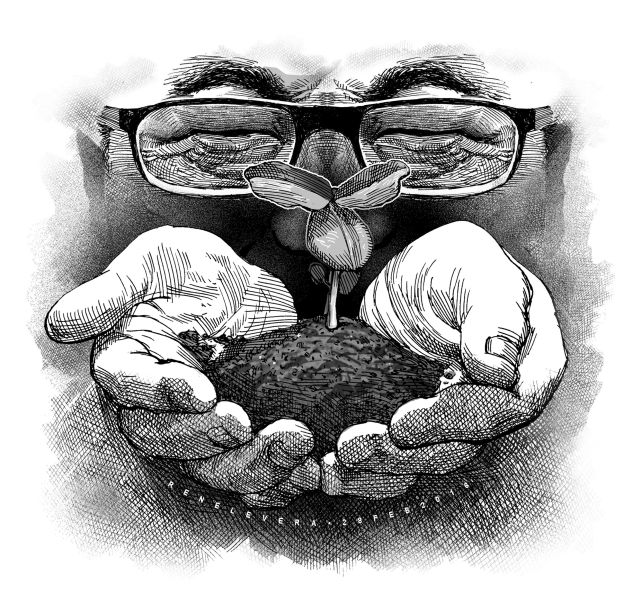
I don’t have a green thumb. But I have a green heart. I mean I love to grow things, which, however, do not always thrive. No seed lying about will escape my hand, especially that of a fruit tree. This I will wrap with tissue paper or whatever enfolding material I might find within reach, and, upon arriving home, shake it off into any available spot in the ground.
I must have taken after my mother, who, for me, has the greenest thumb and the greenest heart in these parts. I cannot remember a time when she did not have flowers around the house – roses, dahlias, liliums, mums, daisies, vandas and others, which visitors must feel the urge to become thieves or beggars of, because the flowers suffer a loss or thinning directly proportional to the volume of my mother’s callers, of which I know one – the worst filcher – myself.
Roses – especially old roses – appeal to me more than any other flower, and of those which I have wangled from my parent only two or three have survived. Despite my research and the consequential measures put in place, some invisible thing keeps gnawing the leaves, and shunting the nutrients through an invisible siding in the ground to I don’t know where. The result? Wire-thin stems with funny leaves, which, nonetheless, manage to climb as high as the verandah to offer me miraculously healthy pink blooms.
I have even less success with fruit trees than with flowers. We do not have much space around the house, but, to the wife’s dismay, I still find room for the next seed that comes along. Lately, I sowed the seeds of little clementine oranges (kiatkiat), and if they germinate and become young plants they will surely get a standing among the calamansi, jackfruit, avocado, cacao, cucumber tree (iba) and soursop (guyabano). Now if only my green heart can reach out to my green thumb.
Because after 20 years our avocado trees have not had any fruit, and, while the cacao occasionally has a yield, we cannot toast the seeds because they lack either the size or bulk.
At times I find myself tempted to cut them down and plant other trees in their place. Did not Jesus suggest so much in the parable which Luke narrates, about a man who had a fig tree planted in his orchard. The tree bore no fruit at all, and this upset the man who had come looking for it. And so he said to the gardener, “For three years now I have come in search of fruit on this fig tree but have found none. So cut it down. Why should it exhaust the soil?” The gardener, pitying the tree, replied,
“Sir, leave it for this year also, and I shall cultivate the ground around it and fertilize it; it may bear fruit in the future. If not you can cut it down.”
I must have left the avocado tree alone for years on end, which speaks of my undying hope that one day I will see hanging among the leaves a pear-shaped fruit, preferably brown. Besides, if the tree has reached 20 years of existence, it at least deserves to exist some more.
Jesus set his parable against the background of repentance. Apparently, Jesus was offering his listeners, who had heard him preaching for the past three years without any change on their part, a last opportunity to turn away from their old, sinful ways.
Which message, in a sense, is likewise addressed to me. I have the habit of concluding my every visit to my mother with the abduction of a flowerpot or seedling. I should be sorry for and stop my pilferage, and be humble enough to own up to what I have been doing behind her back. And God knows I have other sins.
I should take my cue from St. Augustine, who said, commenting on the parable of the fig tree, “Manure is a sign of humility. ‘Let us apply a load of manure, perhaps it may bear fruit.’”